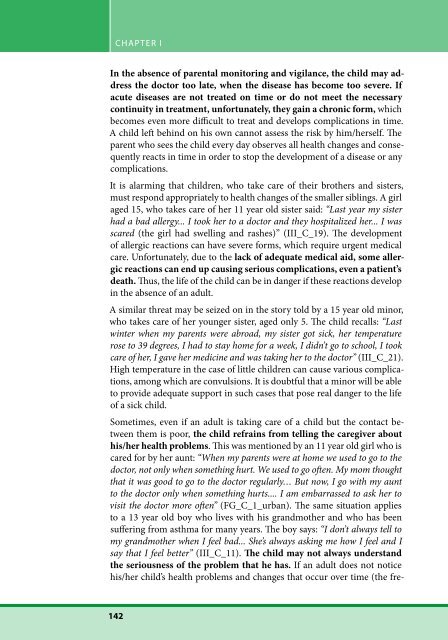specific needs of children and elderly left behind as a ... - IOM Moldova
specific needs of children and elderly left behind as a ... - IOM Moldova
specific needs of children and elderly left behind as a ... - IOM Moldova
You also want an ePaper? Increase the reach of your titles
YUMPU automatically turns print PDFs into web optimized ePapers that Google loves.
CHAPTER I<br />
In the absence <strong>of</strong> parental monitoring <strong>and</strong> vigilance, the child may address<br />
the doctor too late, when the dise<strong>as</strong>e h<strong>as</strong> become too severe. If<br />
acute dise<strong>as</strong>es are not treated on time or do not meet the necessary<br />
continuity in treatment, unfortunately, they gain a chronic form, which<br />
becomes even more difficult to treat <strong>and</strong> develops complications in time.<br />
A child <strong>left</strong> <strong>behind</strong> on his own cannot <strong>as</strong>sess the risk by him/herself. The<br />
parent who sees the child every day observes all health changes <strong>and</strong> consequently<br />
reacts in time in order to stop the development <strong>of</strong> a dise<strong>as</strong>e or any<br />
complications.<br />
It is alarming that <strong>children</strong>, who take care <strong>of</strong> their brothers <strong>and</strong> sisters,<br />
must respond appropriately to health changes <strong>of</strong> the smaller siblings. A girl<br />
aged 15, who takes care <strong>of</strong> her 11 year old sister said: “L<strong>as</strong>t year my sister<br />
had a bad allergy... I took her to a doctor <strong>and</strong> they hospitalized her... I w<strong>as</strong><br />
scared (the girl had swelling <strong>and</strong> r<strong>as</strong>hes)” (III_C_19). The development<br />
<strong>of</strong> allergic reactions can have severe forms, which require urgent medical<br />
care. Unfortunately, due to the lack <strong>of</strong> adequate medical aid, some allergic<br />
reactions can end up causing serious complications, even a patient’s<br />
death. Thus, the life <strong>of</strong> the child can be in danger if these reactions develop<br />
in the absence <strong>of</strong> an adult.<br />
A similar threat may be seized on in the story told by a 15 year old minor,<br />
who takes care <strong>of</strong> her younger sister, aged only 5. The child recalls: “L<strong>as</strong>t<br />
winter when my parents were abroad, my sister got sick, her temperature<br />
rose to 39 degrees, I had to stay home for a week, I didn’t go to school, I took<br />
care <strong>of</strong> her, I gave her medicine <strong>and</strong> w<strong>as</strong> taking her to the doctor” (III_C_21).<br />
High temperature in the c<strong>as</strong>e <strong>of</strong> little <strong>children</strong> can cause various complications,<br />
among which are convulsions. It is doubtful that a minor will be able<br />
to provide adequate support in such c<strong>as</strong>es that pose real danger to the life<br />
<strong>of</strong> a sick child.<br />
Sometimes, even if an adult is taking care <strong>of</strong> a child but the contact between<br />
them is poor, the child refrains from telling the caregiver about<br />
his/her health problems. This w<strong>as</strong> mentioned by an 11 year old girl who is<br />
cared for by her aunt: “When my parents were at home we used to go to the<br />
doctor, not only when something hurt. We used to go <strong>of</strong>ten. My mom thought<br />
that it w<strong>as</strong> good to go to the doctor regularly… But now, I go with my aunt<br />
to the doctor only when something hurts.... I am embarr<strong>as</strong>sed to <strong>as</strong>k her to<br />
visit the doctor more <strong>of</strong>ten” (FG_C_1_urban). The same situation applies<br />
to a 13 year old boy who lives with his gr<strong>and</strong>mother <strong>and</strong> who h<strong>as</strong> been<br />
suffering from <strong>as</strong>thma for many years. The boy says: “I don’t always tell to<br />
my gr<strong>and</strong>mother when I feel bad... She’s always <strong>as</strong>king me how I feel <strong>and</strong> I<br />
say that I feel better” (III_C_11). The child may not always underst<strong>and</strong><br />
the seriousness <strong>of</strong> the problem that he h<strong>as</strong>. If an adult does not notice<br />
his/her child’s health problems <strong>and</strong> changes that occur over time (the fre-<br />
142

















